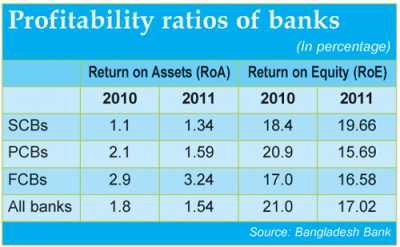Banks' profitability declines in 2011
 The average profitability of the country's commercial banks witnessed a modest decline in 2011 as the quality of the trading portion of their assets deteriorated mainly because of the stock market debacle, officials said.
The average profitability of the country's commercial banks witnessed a modest decline in 2011 as the quality of the trading portion of their assets deteriorated mainly because of the stock market debacle, officials said.
The earnings of banks, in terms of both return on assets (RoA) and return on equity (RoE), came down to 1.54 per cent and 17.02 per cent respectively in the last calendar year from the corresponding levels at 1.8 per cent and 21.0 per cent in 2010, according to the latest central bank statistics.
The profitability of four state-owned commercial banks (SCBs) increased marginally through improvements in their positions in relation to RoA and RoE in 2011 when the profitability of the private commercial banks (PCBs) recorded a decline, the central bank said in its report on profitability positions of banks on December 31 last.
"We've prepared the report based on un-audited and provisional figures, provided by the all 47 scheduled banks," a senior official of the Bangladesh Bank (BB) told the FE Monday.
The RoA and RoE of SCBs rose to 1.34 per cent and 19.66 per cent respectively in last calendar year from 1.1 per cent and 18.4 per cent in the previous one.
The RoA and RoE of the PCBs, however, fell to 1.59 per cent and 15.69 per cent respectively in 2011 from 2.9 per cent 17.0 per cent correspondingly in the previous year.
The central bank official further said the RoA and RoE of six to eight PCBs may fall further if the actual figures about their provisioning, covering their other assets mainly investments in the capital market, are finalised.
The operating foreign commercial banks (FCBs) in the country showed improvements in their RoA - from 2.9% in 2010 to 3.24% in 2011 - but their RoE witnessed a modest decline - from 17.0% in 2010 to 16.58% in 2011. All the nine FCBs, having their operations in Bangladesh, earned an aggregate amount of Tk 22.97 billion as operational profits in 2011.
The contributions of FCBs to the exchequer, in the form of taxes, are expected at Tk 8.81 billion in 2011 when their requirement for provisioning against bad debts would stand at Taka 1.67 billion, according to the BB report.
Total operating profits of all commercial banks stood at Tk 197.38 billion by the end of December 31 last year, the BB data showed.
The banks, however, earned Tk 91.21 billion as net profit in 2011 after adjustment of their requirements for provisioning against bad debts and also making provision for tax payments, worth Tk 33.55 billion and Tk 72.62 billion respectively.
"The profitability of PCBs has decreased slightly in 2011 mainly due to nominal or negative growth in their non-banking businesses including their investments in the capital market," a senior official of leading PCB told the FE.
He also said some PCBs had to keep a substantial amount of pre-tax operational profit for provisioning against valuation loss of their holdings in the stock market.
The country's stock market that has lost substantially so far this calendar year, in terms of market capitalisation of all the listed issues, leading to a sharp drop in its index in the recent months.
The benchmark index of Dhaka Stock Exchange (DSE) -- the country's prime bourse -- which is generally known as DGEN, came down to 4350.47 point Monday from its highest 8918.51 on December 05 last, the DSE data showed.
In 2011, the commercial banks, particularly the primary dealer (PDs) banks, also incurred losses on account of their investment in the government-approved securities because of lower yield on the treasury bills and bonds at a rate which is lower than their cost of funds.
"The average yield on the government securities was at 8.76 per cent which was significantly lower than our cost of funds," another private banker said, adding that 12 PDs have invested worth around Tk 180 billion, in excess of their statutory liquidity ratio (SLR) requirement with the central bank.
Currently, three treasury bills (T-bills) and four bonds are being transacted through auctions to adjust the government borrowings from the banking system.
The T-bills have 91-day, 182-day and 364-day maturity periods.
On the other hand, four government bonds -- five-year, 10-year, 15-year and 20-year -- are being traded in the market.
The central bank had earlier selected 15 PDs -- 12 banks and three non-banking financial institutions (NBFIs) -- to deal with government securities in the secondary market.
Financial Express/Bangladesh/ 13th March 2012




Comments